
Are you into homemade almond milk, but don’t know what to do with the leftover pulp? Us too!
But don’t worry — we’ve got good news! Luckily, there are so many things you can do with the leftover pulp. Today, we’re going to show you some of our favorites: How to make almond meal from leftover almond pulp. It’s perfect for baked goods and beyond!
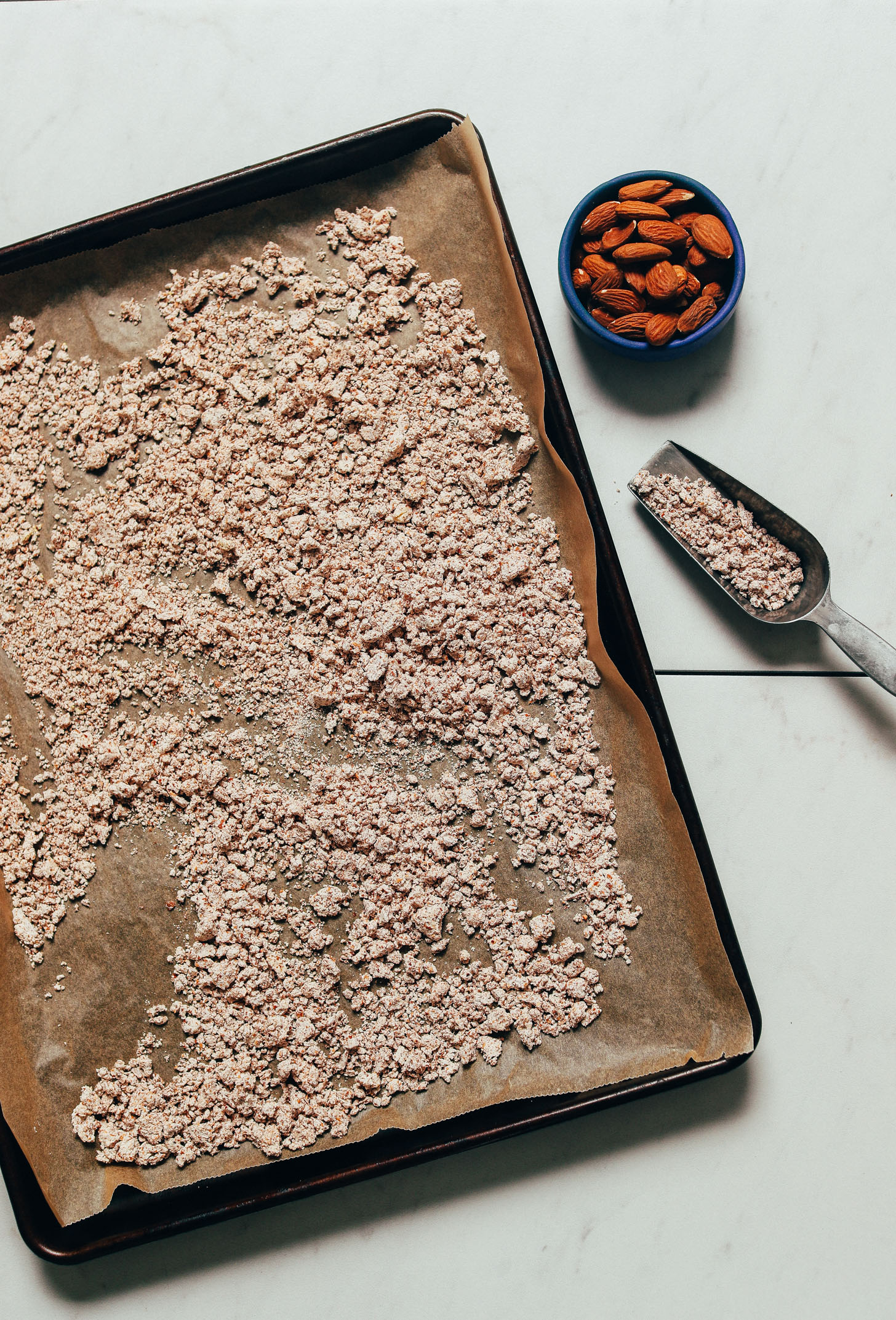
How to Make Almond Meal From Almond Pulp
The first step in making almond meal from almond pulp is to make almond milk. Our Homemade Almond Milk is simple to make and yields a rich, creamy beverage that actually contains a substantial amount of almonds, unlike most store-bought products.
What’s leftover from the process of making almond milk is almond pulp.
The almond pulp is then dried in the oven at a low temperature, left on the counter to cool overnight, and finally, processed into almond meal using a food processor or high-speed blender.
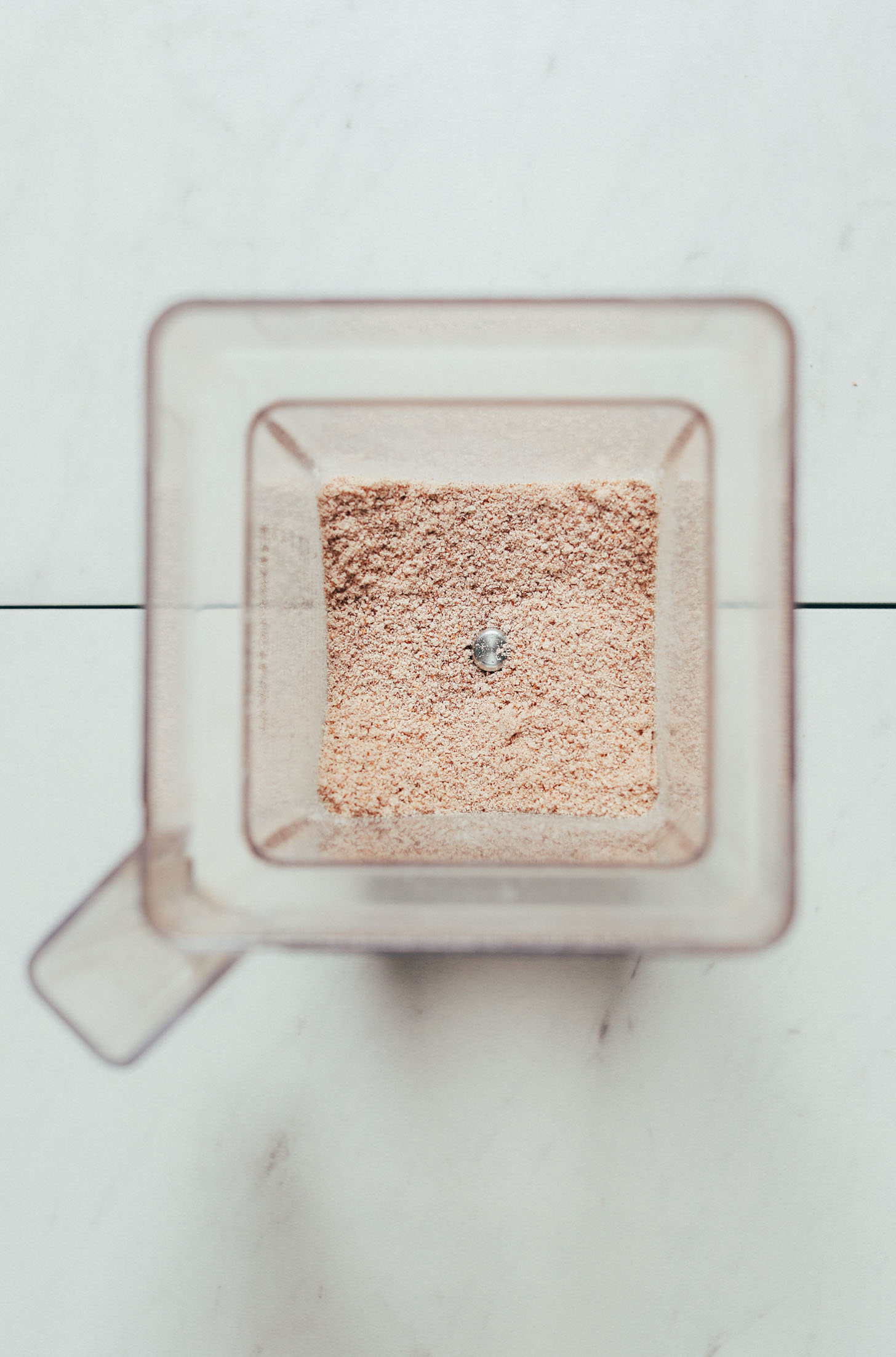
How to Use Almond Meal from Leftover Pulp in Recipes
Compared to almond meal ground from whole raw almonds (pictured right in the photo below), almond meal made from leftover pulp (pictured left in the photo below) has a darker color, feels drier, and is slightly lighter in weight.
We have found that when using almond meal made from leftover pulp in recipes that call for traditional almond meal, it is sometimes helpful to compensate with additional water, oil, or fat. That’s because some of the fat from the almonds is lost in the process of making the almond milk.
Almond meal can be used in a variety of recipes — crackers, cookies, muffins, quick breads, and more. If you’re looking for inspiration, give one of these recipes a try!
- 1-Bowl Vegan Gluten-Free Crackers
- The Best Almond Meal Chocolate Chip Cookies (Vegan + GF)
- Banana Almond Meal Muffins (Gluten-Free + Vegan)
- 1-Bowl Vegan Gluten-Free Banana Bread
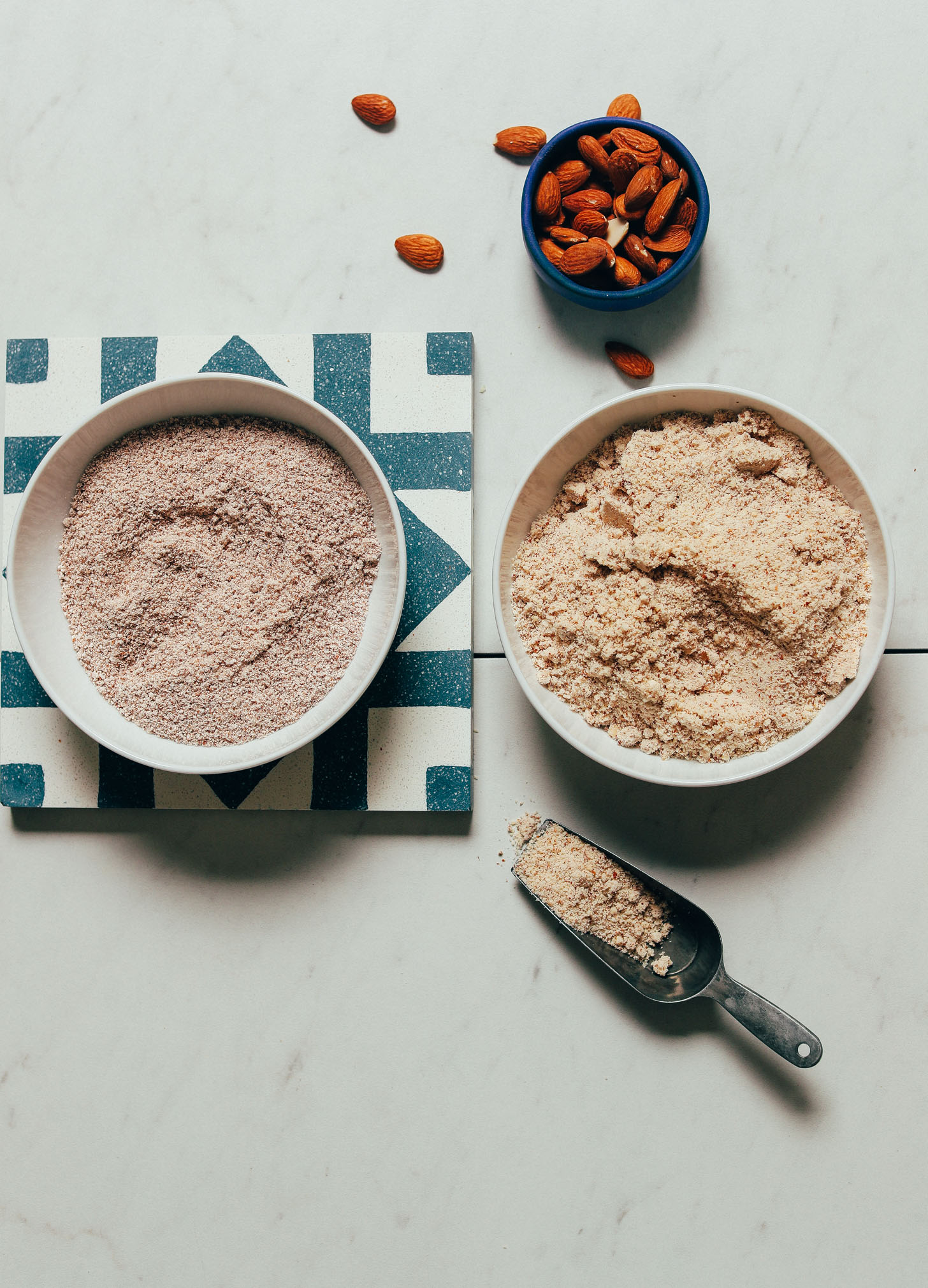
How to Use Raw Almond Pulp in Recipes
For those of you wanting to use your raw almond pulp right away, we’ve got something for you, too!
Instead of drying and blending your almond pulp into almond meal, you can use the raw almond pulp in a few ways. Note: We DO NOT recommend using it in baked goods in place of almond meal as it will likely be too heavy, clumpy, and wet.
But for granola or energy bite recipes, raw almond pulp is perfect! In granola recipes, we recommend stirring it into the batter in place of some of the oats or nuts/seeds.
For inspiration, consider replacing some of the oats or nuts/seeds in one of these recipes with raw almond pulp:
- 7-Ingredient Brownie Bliss Balls (Made from Almond Pulp!)
- Banana Bread Granola
- Almond Joy Granola
- Sea Salt Dark Chocolate Granola
- No-Bake PB & J Energy Bites
- Mango Energy Bites
- Dark Chocolate Hemp Energy Bites
If you try this recipe, let us know! Leave a comment, rate it, and don’t forget to tag a photo #minimalistbaker on Instagram. Cheers, friends!
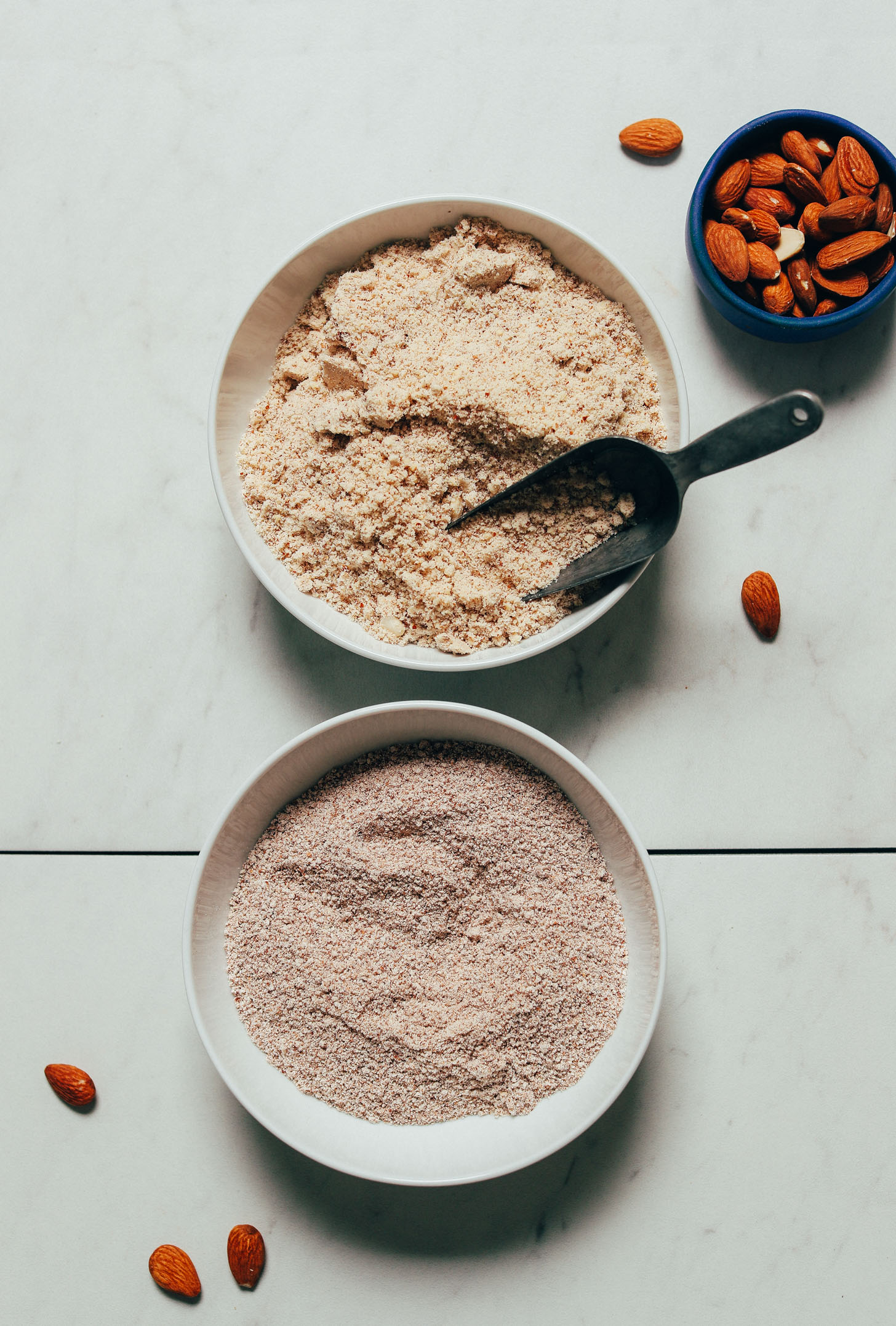
How to Make Almond Meal from Almond Pulp
Instructions
TO MAKE ALMOND MILK
- Soak almonds in very hot water with salt for 1 hour, or in cool water overnight. Then rinse and drain thoroughly.
- Add rinsed, drained almonds and 4 cups water to a high-speed blender and blend on high for 1 minute. Drape a nut milk bag over a mixing bowl and carefully pour the almond milk into the nut milk bag. Squeeze out the milk, making sure to squeeze thoroughly to leave pulp as dry as possible.
FOR ALMOND PULP
- At this point you have wet, raw almond pulp that can be used in things like energy bites and granolas (see list of ideas above). It can be stored in the refrigerator up to 1 week, or frozen for up to 1 month, often longer.
TO MAKE ALMOND MEAL
- Heat oven to 200 degrees F (93 C). Spread pulp evenly onto a parchment-lined baking sheet (small clumps are okay).
- Bake for 1 hour 45 minutes – 2 hours. Stir every 30 minutes for the first 1 ½ hours, then at 15-minute intervals until pulp is as dry as possible, but not toasted (see photo).
- Let the dried meal cool completely (we let ours cool overnight) before adding to a high-speed blender or food processor. Blend on high until a fine, powdery flour is achieved — about 15 seconds (it’s fast!).
- Be careful not to overblend or the almond meal will get clumpy. Check your blender for bits of almonds and continue blending, occasionally removing your blender from the base and shaking to ensure all almonds are well blended.
- Transfer to a jar or container and store up to 1 month unrefrigerated, often longer. One cup almonds used in making almond milk should yield roughly 2/3 cup raw almond pulp OR 2/3 cup dried almond meal.
Video
Notes
*Nutrition information is a rough estimate calculated with slightly less calories, fat, protein, and carbohydrates since some are lost in the process of turning the almonds into almond milk.
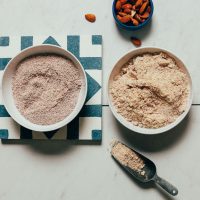
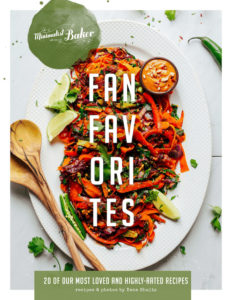
Emerald says
Another use for almond meal besides in cooking is to use it as a facial scrub and exfoliator. No more microplastics in your facial scrub. Keep a supply in a tight jar in the fridge with a small jar for regular use in the bathroom.
Great idea! Thank you for sharing!
Christine says
I LOVE this website and the recipes! I’m a holistic chef and do a lot of vegan and gf catering for retreats…and I use your website to look for new and interesting offerings. I have made many of your recipes – especially the baked goods AND I know they will be great without having to test the recipe beforehand. So thank you very much!!!
For this recipe I am wondering if the nutritional information is correct. I’ve been trying to figure out how to create nutritional info for crackers I make from almond pulp and vegetable juicing pulp. The nutritional info listed here is basically for whole almonds. I’ve been searching for nutritional data on almond pulp…but not finding anything.
Do you have any thoughts/ideas for this?
Thank you!!
We’re so glad you enjoy our recipes, Christine! The nutrition info is definitely a rough estimate as we have no way of knowing how much of the vitamins/minerals/fiber/etc. are removed in making the almond milk. Sorry we can’t be of more help on that!
Mikey says
Would love some more recipe ideas and more info on the energy bites included in the article but overall good information. I had not been soaking my almonds so I will give that a go and see how it goes. Also hadnt been adding my golden milk powder to the almonds before straining. Might stain my bag but be worth.
Thank you for taking the time to put this web page together.
Happy eating!
Mikey
Hi Mikey, thank you for your comment! Here’s a recipe for energy bites made with almond pulp: https://minimalistbaker.com/7-ingredient-brownie-bliss-balls-made-from-almond-pulp/. Hope that helps!
Elizabeth Vanden Beukel says
I’ve used your recipe for almond milk (absolutely delicious!!) I have a dehydrator. At what temperature and for how long should I dry out the pulp in order to make almond flour?
Hi Elizabeth, we haven’t experimented with a dehydrator so we’re not sure! Perhaps another reader will be able to chime in?
Allyson says
Hi Elizabeth – I dehydrate at 100 degrees for 4 hours. My problem is finding ways to use the dried pulp. All the recipes I find are for wet pulp or almond flour…I’m not finding enough for almond meal for the volume we have (I make a gallon 2x/week). Any suggestions?
Thank you for sharing your experience, Allyson! Check out tip 1 in this recipe round-up of almond pulp recipes: https://minimalistbaker.com/12-easy-almond-pulp-recipes-sweet-savory/. Hope that helps!
Kiera says
Could we possibly use a dehydrator to dry out the wet ish almond meal instead of the oven?
That would work beautifully!
Siobhan says
Hi! How much replacement oil/fat/water is needed when baking with almond meal as a byproduct of almond milk?
Hi Siobhan, that will depend on how you’re using the almond meal and what the particular recipe calls for. Hope this helps!
Siobhan says
Well, for example – a cookie recipe calls for 1 cup of amond flour, so if I sub in 1 cup of almond meal from almond milk, how much fats should I add back in? I’ve been using almond oil and it seems to take a lot to get the mix to behave like dough or batter! Thanks. :)
Almond flour and almond meal do have different textures so they do not work the same way in all recipes, but if you made almond meal from almond milk you should be able to use that almond meal without any other recipe adjustments (as long as the recipe calls for almond meal). If a recipe calls for almond flour you may need a bit of extra liquid (probably water or milk, not fat) since almond meal is typically more dense than almond flour.
Siobhan says
Thanks!!
Rachel Muncie says
I didn’t know I should put the pulp in the fridge and it was stored in a container overnight as I made the milk later in the evening. Do you think it’s still safe to make meal?
Probably not, unfortunately!
Dianna says
Just to clarify…the pulp cannot be left out but the meal can once it is baked (to cool overnight), correct?
Yes!
SGirling says
Oops – I toasted the pulp with the last few minutes. Is it still useable?
Hi, do you mean it’s burnt? If so, probably not! If it’s just a little extra toasty, then sure!
Eileen Moran Griggs says
I’ve tried this with almonds and it works great! Have you tried it with other nut pulps, like cashew or hazelnut?
Hi Eileen, we haven’t, but it should work just as well!
Allison says
Has anyone used a dehydrator for this process?
Nonie says
I’m trying this as I type. I have instructions to do 150 degrees for 4-8 hours. Will keep checking for dehydration without toasting..
Andrew says
It didn’t work out to well in my dehydrator but maybe I did something wrong. I found what works best for me is using my slow cooker as the insert is metal. I pop it on medium setting with the lid slightly off for ventilation and it defrosts and then dries out nicely (I keep my pulp in freezer until needed)
Pauline says
Thank you.
I also make hummus from my almond pulp instead of drying it.. lemon, garlic, olive oil, tahini, salt, pepper cumin. Mix together using a recipe for hummus. Just replace the chickpeas with almond pulp.
Very cool! Thank you for sharing, Pauline!
CT OHare says
I do the same thing, incredible!!!
Kerry says
What a great idea!!
nurp says
Would it help to leave the oven door slightly open so the moisture escapes?
Hi there! In our experience it works best to leave the door closed to retain the heat inside the oven, which will dehydrate the pulp fastest!
marla reiter says
Hi there! So I followed all directions as far as 200 degree oven, 1 hr,45 min – 2 hours, let dry overnight. My pulp is still very damp/wet. Is this normal? If not, what did I do wrong? Did I use too much on cookie sheet? Nonetheless, I put some into blender (not food processor) and it did not pulse at all into a powder. I am so disappointed. Help!
Hi Marla, sorry to hear that happened! Overcrowding the baking sheet can definitely cause that.
Vidya says
Hi , I also use my almond similarly, as a substitute in almond flour one minute mug keto cakes.
1/4 cup of almond meal, a scoop of vanilla protein powder, 12tsp of baking powder, 1 egg well beaten, about 12-14 g of erythritol 100%, 1 tbs of butter / coconut oil .
Mix well, and add to a grease teacup and microwave for 1 minute.
Thanks for sharing!
Ani says
I think that should read 1/2 (half) a teaspoon of baking powder?
Sue says
I think it would make good Dukah
Dianna says
12 teaspoons of baking powder seems like a lot! Is this a typo?
Audrey says
Can you use almond meal in smoothies.
We haven’t tried it, but we think it would work! We’d say start with 1 Tbsp.
Sarah says
Just wondering, can you use this flour for macrons? I don’t know if the lower fat content would affect anything.
Hm, we haven’t tried it and aren’t sure! But typically when baking with almond meal made from pulp, it’s best to increase the oil or another fat component. Let us know if you do some experimenting!
Sarah says
Hi! The lowest my oven goes is 275 F. Any tips on length of time for a higher heat? Also curious what oven you have that has a heat setting that low?
Thanks for all the amazing recipes!!
Hi Sarah, we believe it was a Wolf oven. We’d say maybe 1 – 1 1/2 hours, checking more often than suggested. Let us know how it goes!
Sarah says
Thanks! I did 1 hour at 275 F and let it sit overnight and it seems like it worked!
Great! Thanks for sharing!
Anjana Talapatra says
These are great ideas. I generally peel the almonds after soaking and before making almond milk for our daily smoothies. We prefer the taste. Then I follow virtually the same process to make almond flour. We use the flour weekly to make David Lebovitz’s brown butter financiers. They have turned out fantastic every time. I increase the butter quantity from his recipe by about 10 % to account for the lower fat content ( I think?) of the flour.
Thanks for sharing, Anjana!
Betty says
Would you please share 2 things?
1) How do you peel almonds
2) What are, or how can I find David Lebovitz’s brown butter financiers?
Thanks
Anjana says
Hi Betty,
If you soak raw almonds for a few hours in hot water , the peels slide off pretty easily. I do it by hand and it doesn’t take more than a few minutes.
Ypu can find David Lebovitz’s recipe here: https://www.davidlebovitz.com/brown-pastry-browned-butter-financiers-recipe-french/
I don’t know if I am allowed to post links in the comments here, but if the link does not work, a online search for brown butter financiers should yield a link to his recipe
Saba says
So helpful👍🏻 many many thanks, I was searching for the nutrition facts of almond pulp leftover. I wanted to enter some fibers to my breakfast meal without feeling guilty & without getting out of ketosis 😃
We’re so glad you found it helpful, Saba!
Jessi says
So I make a variety of plant milks. Plain and combos. I normally take the pulp and add them (mixed kind) to ziplock bags and freeze them to make a dry cereal for the children when in the mood. However, it’s gotten pretty boring at this point. Anything else you think I can make with it?
Hi Jessi, check here for inspiration: https://minimalistbaker.com/12-easy-almond-pulp-recipes-sweet-savory/
Justin Nunnink says
Very cool to know of all these ideas for leftover almond meal. Thank you. I was wondering if you knew anything about the nutritional value of the letter over almond meal. Did it just get drained out into the almond milk?
It is reduced, but some nutritional value is still there.
AP says
Excited to make this today. Just got a Vitamix for Christmas and there is a whole universe of homesteading goodness awaiting me. Tried yesterday to make zucchini muffins from the wet almond pulp and you are so right— yuck! Had to throw out the batch. I appreciate your post and love the blog!
Enjoy =)
Tracy says
FYI- A regular cheapie blender worked surpringly well!
Thanks for sharing, Tracy!
Jill Lopate says
I make almond milk all the time as well as walnut milk. I sweeten mine with a date or two. The leftover pulp is also sweetened by way of the dates. I dry it and blend it into flour. I then use my “sweet flour” to make cookies that I love. My question is, how long can I safely keep the sweetened flour?
Hi Jill, if storing the flour in the fridge, we would expect it to keep 3-6 months.
Lisa Ting says
Thank you for the recipe. I made homemade almond milk for the first time recently and threw out the almond meal because I didn’t know what to do with it. I felt awful! So I went online next time and found this. So I didn’t read your instructions fully :D and mixed mine in wet with something and yuck. So today I’ve made almond milk again and I’m drying it. I look forward to using it as it should be used, and not wasting it again!
We’re so glad you found what you were looking for! Let us know how it goes =)
Jenny Lewis says
Oh my goodness I love minimalist baker recipies! I am so inspired! I just made the almond milk (best tasting I have ever had!) and there is more! More recipies and more inspiration. I feel like I found a real treasure in your site. Thank you!
Yay! Thanks so much for the sweet note and lovely review, Jenny! xo
Wwellie says
This is really useful and I can’t wait to try the recipes, but I’d love some more clarification on how much water or oil or fat to use to then be able to bake with the pulp in recipes that state the amount of normal almond flour (or ground almonds as we call them in the UK)?
Many thanks
Hi, we are glad you find it useful! The amount of water or oil to add will depend on the recipe you are using so unfortunately we don’t have a more precise recommendation. We did test it out in our Almond Flour Crackers recipe (https://minimalistbaker.com/1-bowl-vegan-gluten-free-crackers/) and specified the oil/water measurements in the notes. Hope that helps!
Corey says
Hi there! What an awesome idea! I have been looking into making my own milks and was checking out your oat milk recipe. I haven’t tried it yet, but sounds like the oats get ground up pretty well, so pulp may not be an issue. Is that the case? Otherwise, I may try the above recipe! Thanks for all of your creativity!
Hi Corey, thanks so much! The oat milk also leaves residual pulp. Hope that helps!
christina fisher says
Genius! Thanks so much.